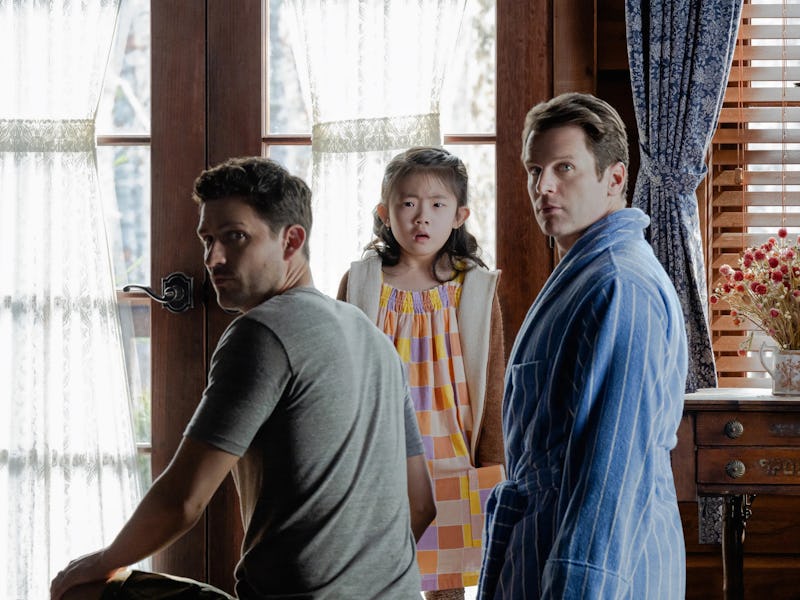The Endings of The Last of Us and Knock at the Cabin Are Opposites. Which One is Right?
Knock at the Cabin and The Last of Us are two parallel tales of the apocalypse that come to very different conclusions.

Spoilers ahead for Knock at the Cabin and The Last of Us Season 1/Part I.
The major twist at the heart of M. Night Shyamalan’s latest film, Knock at the Cabin, isn’t really a twist at all. The story follows Andrew and Eric, a gay couple, and their daughter Wen as they are held captive by four religious zealots who are firmly convinced that the world will end if this family doesn’t choose to sacrifice one of their own. The twist, it turns out, is that everything these zealots said was true, and a sacrifice will indeed be necessary to stave off the apocalypse.
At the climactic moment of The Last of Us, Joel, the story’s main character, is required to make a very similar decision. In the game, at least, Joel shepherds Ellie across the country because she’s immune to the cordyceps virus, only to discover that she really could save humanity. The Fireflies can develop a vaccine using her DNA, but extracting it would kill her. Joel has to choose: Does he stop the Fireflies and save Ellie, or allow them to kill her in hopes that doing so could save the world?
In the final moments of these stories, Joel comes to a very different answer than Eric and Andrew. Eric ultimately insists that Andrew kill him, and Andrew eventually complies. The movie ends by acknowledging their loss and what they’ve saved in exchange. It’s a chilling ending that dares to offer a glimmer of hope for the future this father and daughter will share together. Joel makes the opposite decision. Faced with the choice between saving his found family or the world, he chooses Ellie. He saves her without her knowledge by massacring an entire hospital's worth of people and then lies, telling her that there was no cure to be had.
Joel comes to a very different answer in The Last of Us than Eric and Andrew do in Knock at the Cabin.
Joel’s justification for his choice is seeded in the way he looks at the world. It’s his cynicism about people, and his knowledge of what they’re capable of, that ultimately leads him to choose one person over many. In Episode 4 of the show, he explains why he’s continued living in spite of everything: “You haven't seen the world, so you don't know,” he tells Ellie. “You keep going for family. That's about it.”
Andrew espouses a similar notion for much of Knock at the Cabin, saying that he doesn’t believe the cultists who have told him the world is going to end, and wouldn’t ultimately care if it did. Andrew’s anger comes from his experiences being an openly gay man in a world that is at best belligerently tolerant of him and at worst openly hostile to him. He doesn’t see the world as worth saving, but Eric, the one person he loves, does. It’s Eric who convinces him to make the sacrifice, not just for strangers but for their daughter, who should get the chance to live a rich, fulfilling life of her own in a world filled with other people.
The Last of Us and Knock at the Cabin seem to exist in closely related moral universes, one where there’s a stark choice to be had between saving those you love and saving everyone else. The way these stories end suggests that, although Joel and Andrew arrive at opposite answers, the choice will carry scars either way. Joel and Ellie remain a family at the end of The Last of Us, albeit a family weighed down by a dark secret. Andrew and Wen, in contrast, will carry grief with them forever but know that their loss was everyone else’s gain.
The Last of Us and Knock at the Cabin are two sides of the same coin.
Knock at the Cabin turns out to be the more hopeful of these two endings, in part because it believes in other people in a way that Joel doesn’t in The Last of Us. Andrew and Eric choose to give up everything to save a flawed, broken world filled with people who may judge or hate them. Joel, by contrast, thinks that sacrifice is not one worth making. He knows too much about what people are capable of to think that a person he knows to be good should be sacrificed in service to some abstract notion of humanity writ large. Ellie is innocent, and in Joel’s mind, she’s the one thing worth saving.
Like any character in a Fast & Furious movie, Joel prioritizes family over all else. The video game is clear about the darkness inherent in Joel’s decision and never takes the leap to suggest that he was right to make it. The choice is at best morally ambiguous, and at worst completely abhorrent, but it’s Joel’s decision to make, and all a player can do is go along for the ride.
Joel is who he is, and his cynicism about the world helps him justify his choice. Life goes on, after all, but there will be no miraculous return to how things were before. Eric and Andrew save the world from an apocalypse in Knock at the Cabin at great personal cost. For Joel, the apocalypse has already arrived, and it ended any hope he had for humanity. In choosing to save Ellie, he’s saving his own hope for a better future, and sacrificing the world’s hope in exchange.
Knock at the Cabin is playing in theaters now. The Last of Us is streaming on HBO and HBO Max.
This article was originally published on